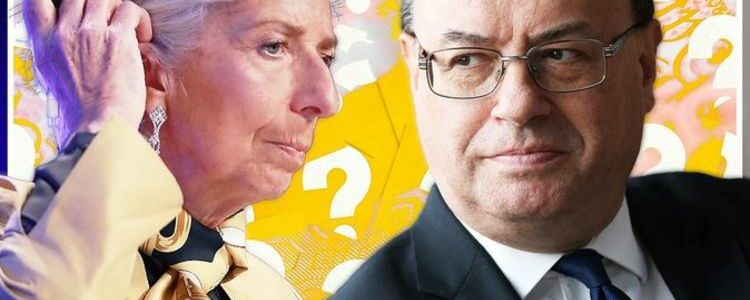
Brexit Britain’s Bank of England shakes off EU – What’s next for pound sterling?
Andy Webb warns banks' interest rate rises may not be beneficial
We use your sign-up to provide content in ways you’ve consented to and to improve our understanding of you. This may include adverts from us and 3rd parties based on our understanding. You can unsubscribe at any time. More info
After the Bank of England raised interest rates in December the pound has steadily climbed to now stand at 1.36 to the dollar and 1.20 against the Euro. The strength of the pound can be partly put down to a difference in monetary policy with the Bank of England being one of the first central banks to raise interest rates. Matthew Ryan, Senior Market Analyst at Ebury, said: “We think that sterling is well placed to continue outperforming many of its major counterparts in the coming months. The MPC’s near-unanimous vote in December makes us increasingly confident that another rate increase is on the way in February, with one of the most aggressive paces of hikes in the G10 to follow on at least a quarterly basis through 2022.”
Ima Sammani, FX Market Analyst at Monex Europe, agreed the probability of a further rate hike was now higher, particularly given data on the UK job market released this week.
The Bank of England had previously held off raising interest rates in November over fears of the strength of the job market when furlough ended, however, new stats have shown rising numbers of payrolled employees and falling unemployment.
While the Bank of England is increasingly expected to tighten monetary policy the European Central Bank (ECB) has repeatedly shied away from raising interest rates with suggestions from its president Christine Lagarde no movement would come before 2030.
This difference has been a key factor in the differing strengths of the two currencies which could continue if the ECB holds its current course.


Shane O’Neill, Head of Interest Rate Trading at Validus Risk Management, described the euro as “everyone’s dog” with markets pricing in little movement ahead.
But he warned: “If Christine Lagarde changes her rhetoric even slightly…the euro stands the most to gain.”
Questions of whether the ECB might change tack have heightened today after figures revealed the scale of inflation in the Eurozone, now at its highest since the single currency was launched.
One central bank which does seem likely to follow the Bank of England’s lead though is the US Federal Reserve, with growing speculation there will be several rate hikes later this year.

Mr O’Neill explained markets were now pricing in four rate hikes from both the Federal Reserve and the Bank of England with the question now being which central bank would deliver on what was expected.
He warned that the Federal Reserve could end up out-delivering though if inflation begins to fall in the UK.
“If we start to see inflation drift lower which I think we will, I think the Bank of England is going to take its foot off the gas and then we could see that fall back in sterling,” he said.
The impact of market expectations was previously seen in November when heavy hinting had led to a rate rise being priced in.
DON’T MISS:
‘Great concern’ as inflation to last longer than expected [ANALYSIS]
M&S closes branch after nearly 100 years [LATEST]
Pressure mounts on EU over inflation [SPOTLIGHT]

When it didn’t materialise sterling took a hit.
Mr O’Neill said he was “sceptical” of whether the Bank would get four to five rate hikes in this year meaning while the pound was likely to rise in February it could fall further in the year if the Bank didn’t behave as expected.
Ms Sammani however suggested action by the Federal Reserve would not necessarily get in the way of the pound, adding that sterling still had further room to grow.
She added that the ongoing global recovery since the pandemic was also likely to continue to provide a boost.
Mr Ryan commented: “The rapid rollout of booster jabs, and the UK’s more relaxed approach to omicron relative to much of Europe, should also continue to support the pound.”
Source: Read Full Article